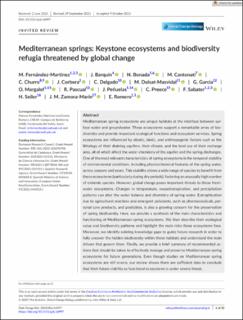Please use this identifier to cite or link to this item:
https://doi.org/10.21256/zhaw-29289| Publication type: | Article in scientific journal |
| Type of review: | Peer review (publication) |
| Title: | Mediterranean springs : keystone ecosystems and biodiversity refugia threatened by global change |
| Authors: | Fernández-Martínez, Marcos Barquín, José Bonada, Núria Cantonati, Marco Churro, Catarina Corbera, Jordi Delgado, Cristina Dulsat-Masvidal, Maria Garcia, Guillermo Margalef, Olga Pascual, Roger Peñuelas, Josep Preece, Catherine Sabater, Francesco Seiler, Hallie Zamora-Marín, Jose M. Romero, Estela |
| et. al: | No |
| DOI: | 10.1111/gcb.16997 10.21256/zhaw-29289 |
| Published in: | Global Change Biology |
| Volume(Issue): | 30 |
| Issue: | 1 |
| Page(s): | e16997 |
| Issue Date: | 8-Nov-2023 |
| Publisher / Ed. Institution: | Wiley |
| ISSN: | 1354-1013 1365-2486 |
| Language: | English |
| Subjects: | Biodiversity conservation; Freshwater ecosystem; Groundwater; Semiarid region; Source |
| Subject (DDC): | 333: Economics of land and resources |
| Abstract: | Mediterranean spring ecosystems are unique habitats at the interface between surface water and groundwater. These ecosystems support a remarkable array of biodiversity and provide important ecological functions and ecosystem services. Spring ecosystems are influenced by abiotic, biotic, and anthropogenic factors such as the lithology of their draining aquifers, their climate, and the land use of their recharge area, all of which affect the water chemistry of the aquifer and the spring discharges. One of the most relevant characteristics of spring ecosystems is the temporal stability of environmental conditions, including physicochemical features of the spring water, across seasons and years. This stability allows a wide range of species to benefit from these ecosystems (particularly during dry periods), fostering an unusually high number of endemic species. However, global change poses important threats to these freshwater ecosystems. Changes in temperature, evapotranspiration, and precipitation patterns can alter the water balance and chemistry of spring water. Eutrophication due to agricultural practices and emergent pollutants, such as pharmaceuticals, personal care products, and pesticides, is also a growing concern for the preservation of spring biodiversity. Here, we provide a synthesis of the main characteristics and functioning of Mediterranean spring ecosystems. We then describe their ecological value and biodiversity patterns and highlight the main risks these ecosystems face. Moreover, we identify existing knowledge gaps to guide future research in order to fully uncover the hidden biodiversity within these habitats and understand the main drivers that govern them. Finally, we provide a brief summary of recommended actions that should be taken to effectively manage and preserve Mediterranean spring ecosystems for future generations. Even though studies on Mediterranean spring ecosystems are still scarce, our review shows there are sufficient data to conclude that their future viability as functional ecosystems is under severe threat. |
| URI: | https://digitalcollection.zhaw.ch/handle/11475/29289 |
| Related research data: | https://doi.org/10.6084/m9.figshare.23220998.v1 |
| Fulltext version: | Published version |
| License (according to publishing contract): | CC BY-NC-ND 4.0: Attribution - Non commercial - No derivatives 4.0 International |
| Departement: | Life Sciences and Facility Management |
| Organisational Unit: | Institute of Natural Resource Sciences (IUNR) |
| Appears in collections: | Publikationen Life Sciences und Facility Management |
Files in This Item:
| File | Description | Size | Format | |
|---|---|---|---|---|
| 2023_FernandezMartinez-etal_Mediterranean-springs-ecosystems.pdf | 7.14 MB | Adobe PDF |  View/Open |
Show full item record
Fernández-Martínez, M., Barquín, J., Bonada, N., Cantonati, M., Churro, C., Corbera, J., Delgado, C., Dulsat-Masvidal, M., Garcia, G., Margalef, O., Pascual, R., Peñuelas, J., Preece, C., Sabater, F., Seiler, H., Zamora-Marín, J. M., & Romero, E. (2023). Mediterranean springs : keystone ecosystems and biodiversity refugia threatened by global change. Global Change Biology, 30(1), e16997. https://doi.org/10.1111/gcb.16997
Fernández-Martínez, M. et al. (2023) ‘Mediterranean springs : keystone ecosystems and biodiversity refugia threatened by global change’, Global Change Biology, 30(1), p. e16997. Available at: https://doi.org/10.1111/gcb.16997.
M. Fernández-Martínez et al., “Mediterranean springs : keystone ecosystems and biodiversity refugia threatened by global change,” Global Change Biology, vol. 30, no. 1, p. e16997, Nov. 2023, doi: 10.1111/gcb.16997.
FERNÁNDEZ-MARTÍNEZ, Marcos, José BARQUÍN, Núria BONADA, Marco CANTONATI, Catarina CHURRO, Jordi CORBERA, Cristina DELGADO, Maria DULSAT-MASVIDAL, Guillermo GARCIA, Olga MARGALEF, Roger PASCUAL, Josep PEÑUELAS, Catherine PREECE, Francesco SABATER, Hallie SEILER, Jose M. ZAMORA-MARÍN und Estela ROMERO, 2023. Mediterranean springs : keystone ecosystems and biodiversity refugia threatened by global change. Global Change Biology. 8 November 2023. Bd. 30, Nr. 1, S. e16997. DOI 10.1111/gcb.16997
Fernández-Martínez, Marcos, José Barquín, Núria Bonada, Marco Cantonati, Catarina Churro, Jordi Corbera, Cristina Delgado, et al. 2023. “Mediterranean Springs : Keystone Ecosystems and Biodiversity Refugia Threatened by Global Change.” Global Change Biology 30 (1): e16997. https://doi.org/10.1111/gcb.16997.
Fernández-Martínez, Marcos, et al. “Mediterranean Springs : Keystone Ecosystems and Biodiversity Refugia Threatened by Global Change.” Global Change Biology, vol. 30, no. 1, Nov. 2023, p. e16997, https://doi.org/10.1111/gcb.16997.
Items in DSpace are protected by copyright, with all rights reserved, unless otherwise indicated.